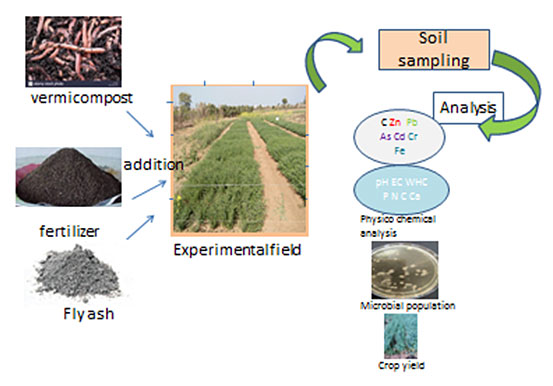Fly ash changes the soil properties which may cause disastrous influence on microbial activity and growth of the plant. However, the scientific studies on the influence of fly ash in various combination with an organic fertilizers on soil properties and microbial response at semi-arid region of Bundelkhand soil is scanty in India. The main objective of this study was to assess the impact of lower or higher doses of fly ash on the soil physico-chemical characteristic, microbial population and growth of leguminous plant chickpea (cicer arietinum L), an important crop of Bundelkhand. The field experiment was conducted during winter, different treatment were made such as control with no amendment of fly ash (T1), amendment of fly ash at the rate of 10tha-1(T2), 20tha-1(T3), 30tha-1 (T4), 40tha-1 (T5),50tha-1 (T6) in combination with vermi-compost (2tha-1 in soil) and Nitrogen, potassium and phosphorus (20kgN ha-1 +20kg k2O ha-1 + 50 kgP2O5 ha-1 in soil) with three replications. In the present study, it was seen that fly ash, increased water holding capacity (WHC), moisture content, pH, soil porosity, organic carbon and electrical conductivity values of the soil. An increasing trend was also seen in P, K, S, and Mn, concentration from 9.87 to 12.21kg ha-1, 121to 124 kg ha-1, 9.36 to 12.14mg/kg and 9.27 to 87 mg/kg, respectively whereas bulk density and total nitrogen decreased from 1.29 to 1.24 g/cm3 and 247 to 205 kg ha-1, respectively in the fly ash applied soil. The application of fly ash at 20tha-1 (T3) was found optimum for bacterial population though the fly ash level exceeding 20tha-1, resulted decline microbial population.

